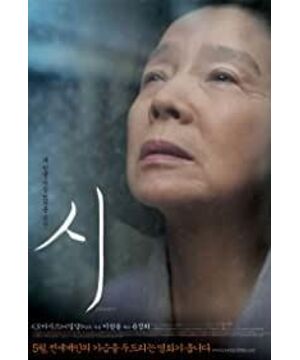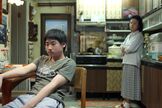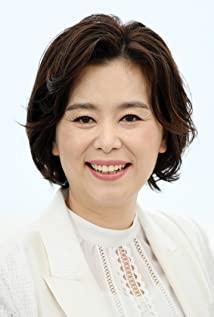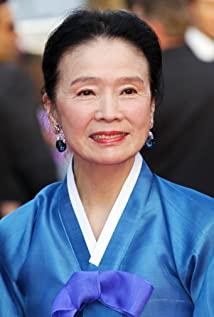When the 60-year-old woman was about to start learning to write poetry, she developed dementia, gradually forgetting language, and lost the ability to identify and call the world. In the process of conceiving the first poem in her life, she found that her grandson, whom she raised independently, raped a girl together with several classmates, causing the girl to commit suicide by throwing herself into the river. In order to cover up the incident, the parents of the classmates bribed it with money to make amends of sin. Facing the fate of her grandson and the deceased, the old woman is caught in the complicity structure of collective self-deception and hypocrisy, as well as the condemnation and helplessness of her personal goodness and morality.
Through the confusion of an old woman writing poetry: where is the inspiration? Why can't I write poetry? The director not only depicts the depressing mental image of the pursuit of art, but also asks more pointedly: Can a pure existence not be hurt by reality? How to find a poetic dwelling in the cruel environment of ups and downs? In a poor life, how to place a keen mind and a compassionate conscience?
Reflecting and involving the "brutal violence of the external world" and "the pure will of the personal spiritual world" is the theme of Li Changdong's film creation. Just like the title subtitle of "Poem of Life", in the quiet and soothing of birdsong and gurgling water, it emerges next to the corpses drifting across the river, as if beauty and filth have the same origin. What Li Cangdong repeatedly explores is the most primitive desire for life hidden in human hearts, how to test out a harsh and firm will after being shaped and oppressed by the real environment and interpersonal relationships.
Li Changdong engaged in theater work in his early years, and later moved to the literary world, and even served as the Minister of Culture of South Korea. His first work, Green Fish (1997), was a scathing indictment of the nature of decentralization. The epic "Peppermint Candy" (1999) depicts the tragic history of the working people at the bottom, thereby alluding to the absurdity of collective history. Oasis (2002) reflects the vulgarity and violence of reality through a love story. The fourth film, Secret Sunshine (2007), shows how a grieving soul coexisting with sin heals itself. Until "The Poem of Life", the style of Li Cangdong's films changed from fierce indignation to subtle and peaceful; what has not changed is that he respects reality, stares at suffering, and inherits the genealogy of social realism.
After 1996, the Korean film system and environment have undergone rapid changes. The era of the military regime has ended. The civilian government regards the cultivation of film culture as the support of national strength. Therefore, film censorship is relaxed, corporate capital is allowed to enter the film industry, and various film festivals are held. , so that the "New Wave of Korean Movies" came into being. Compared with their predecessors, Lee Chang-dong, Park Kwang-soo, Zhang Sun-woo, Lim Kwon-taek and others are more conscious of the film form. While criticizing Korean social problems, they pursue the achievement of film aesthetics and redeem the profound meaning of ordinary things.
Through the film, what Li Changdong wants to tell us is that the meaning of life is not in the sky, but in reality, although it is ugly. The only thing that can protect morality is the pursuit of beauty. Just like the old woman in "The Poem of Life", although she is distressed and deeply guilty, she always wears an elegant floral chiffon shirt and a flowing floor-length skirt, and a scarf with delicate crochet flowers is tied around her neck. The soft white knitted hat she often wears seems to separate her from the world. However, the sun shines through the gap in the knitted hat and caresses her leisurely and pure face. What she longed for in her heart seemed to be detachment and beauty beyond the reality of poverty, and some kind of tenacious character and strong spiritual strength made her obsessed with living a decent and dignified life, in order to bear the weight of survival.
That powerful inner strength comes from sensitivity, compassion, deep affection and righteousness; that is, the character of the poet—the mind moves with the flow, pure joy and joy in common with all things. The old woman is like Jesomina, the innocent girl in Fellini's 1945 film "The Road," who always has an inner ear listening to what's going on, rotten, broken. Perpetually oscillating between ecstasy, semi-divine satisfaction and depression, guilt, and remorse.
Swinging between the two poles of the emergence of poetry and the suffering of reality, the old woman inevitably has to examine her own flaws and imperfections. While excavating her inner guilt, she pursues poetic beauty; she cannot escape the judgment of her conscience, nor can she stop seeking transcendental redemptive meaning. Whenever her emotions clashed violently, she took out her notebook and wrote down short, heartfelt lines of poetry.
In the beginning, "writing poetry" was her way of confronting violence. The family members of the perpetrator took her to discuss ways to avoid punishment. Seeing them ignoring all the contradictions and uncertainties in life, she suddenly left the table, walked outside, squatted in front of a clump of cockscombs, and wrote "Flowers as red as blood", as if she was exposing those who shelter (the flower language of cockscomb) herself. The bloodshed and cruelty of the beneficiaries also seem to reveal their heavy regrets. When she went to her grandson's school, she saw the children playing freely, as if the death of a female student at the same school had not affected the world at all. She looked up at the sky in confusion, then lowered her head and wrote: "The birds are singing, what are they singing? "
She left the hospital and learned that she had dementia. On her way to raise reparations, she passed a calm lake that reflected the bleak twilight, and she wrote: "Time flies, flowers fade," perhaps thinking of the impending death, and the destination of the dead girl, a flowing river. She came to the bridge where the girl jumped off, and her white hat was swirled by the wind and landed on the river, like a weak corpse, slowly drifting across. Her fate seemed to echo that girl's.
Walking towards the river where the girl was buried, she took out the notebook, but couldn't write for a long time. At this moment, it started to rain, and the rain washed violently, her thin body. The rain fell like her broken mind, crashing down onto the blank paper, writing an invisible confession. Dragging her water-soaked skin, she dedicated herself to the old man in her care. Since then, she has had the same humiliated body as the girl, and has also borrowed compensation from the old man to complete her protection of her grandson.
For smooth reconciliation, the families of the perpetrators asked the old woman to visit the girl's mother. The old woman walked into the open and bright countryside farmland, and saw the ripe apricots falling under the tree. She took a bite and wrote on the paper: "Apricots that have fallen into dust, crushed and trampled, are waiting for rebirth." The admiration of the beautiful scenery is like a prayer for a dead girl, a compassion for a lost life. When she meets the simple and dark woman, she shares the insight she just got from nature with naive excitement, forgetting that the woman is the mother of the girl. After saying goodbye to the woman, she suddenly remembered the purpose of the trip, but did not dare to look back and apologize to the girl's mother.
If the false reality surrounding the old woman is to hide the truth, then the old woman writes poetry to tell the truth of the existence of things. Through "writing poetry", she truly communicates with others, generates a strong resonance, transforms the suffering of life, and renames the plots of love, hate, life and death. At the end of the film, a series of empty shots is like the reverberation of the old woman reciting "Song of the Sisters", leading her into the scene of the girl's life before her death. Slowly, she opens herself to the girl, and with the deepest understanding and sympathy, stacks up. match each other's destiny.
The poet Rilke said: "If you want to have enough vision, you must go between the shadows, eat with the dead, share their poppies." Fearless, the old woman returned alone to that destroyed world, revealing Open the hidden things, explore all the forgotten existences, bravely push yourself to the limit, and write for those buried and hidden freedoms. In the end, through various rehearsals, she clearly sacrificed her life to atone for this meaningless world, and defended the girl's loneliness with the last breath of her soul. In the afterlife, she will be by the girl's side, with suffering.
View more about Poetry reviews











